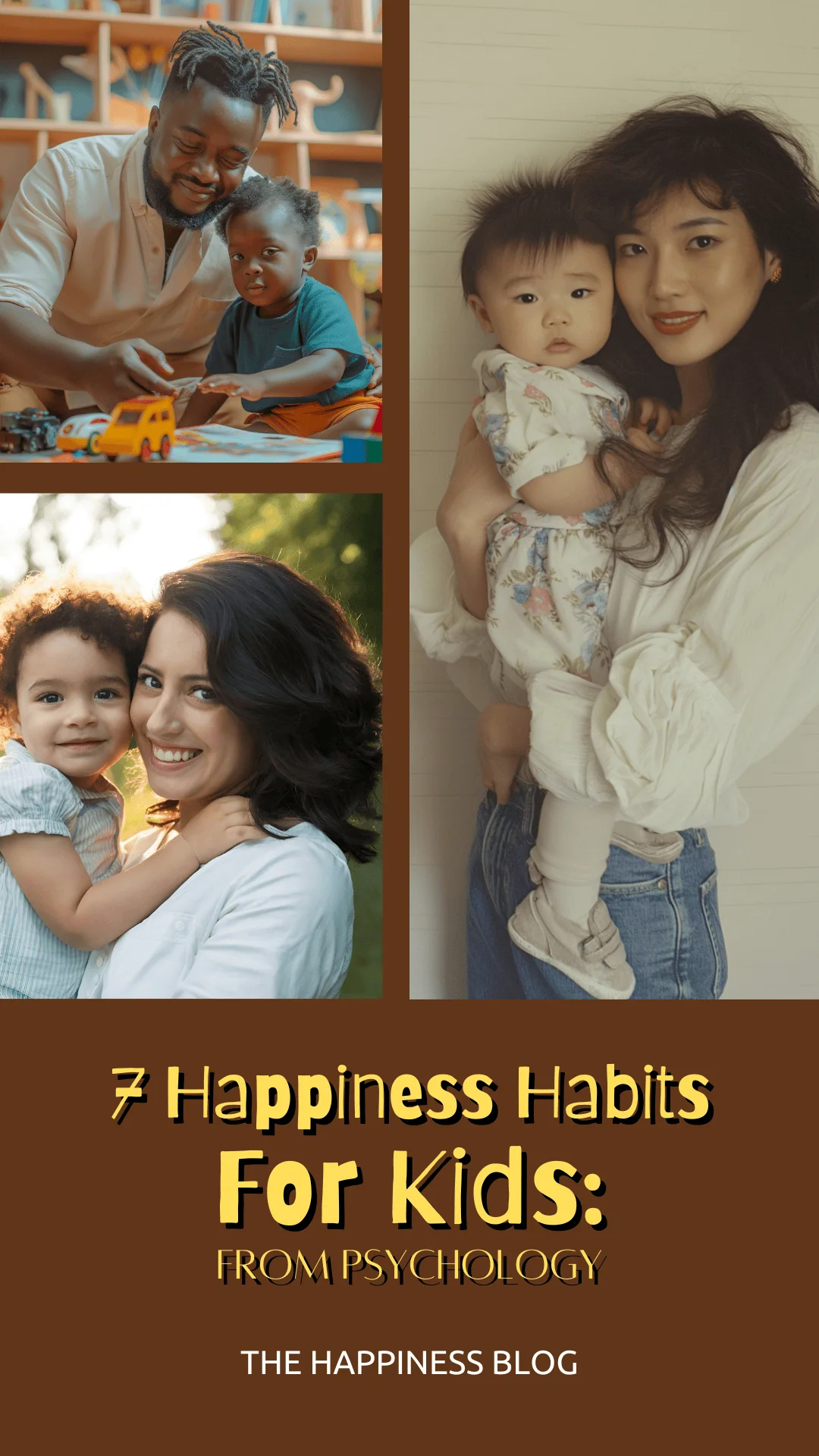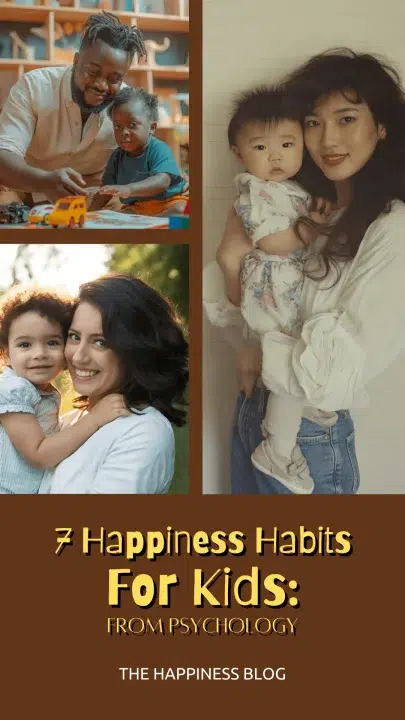Today's Saturday • 10 mins read
You don’t have to sacrifice your peace of mind or all of your time to raise happy kids. You can have both, and a happy child.
The main idea is to teach them the happiness skills at the right age. When is that?
Kids don’t fully form their thinking patterns until they are about 9 or 10. Before this age, how they think about the world, themselves, and their abilities is still growing and shaping.
So, if we can teach them to see things better at this age, it can make a big shift in how they see and handle problems in the future.
These happiness habits can help your kids grow up more positive, happier, and more in charge of their behavior.
7 Happiness Habits For Your Kids: From Positive Psychology
1. Help Them Become More Optimistic
Research shows that children who were trained in optimistic thinking had less depression and emotional difficulties later.
Another study showed that optimists show better physical health and greater success in academics, athletics, and relationships.
Start small. • Ask your child to share one good thing about their day at dinner. • Point out the bright side when they bring up a challenging situation. • Train them to treat difficult times and failed attempts as short-term. • Celebrate their efforts. • Prod them to find solutions instead of dwelling on a difficulty.
Notice their optimistic moments. • When your child shows hope or looks forward to something with optimism, acknowledge it. You could say, “I love how excited you are about your upcoming science project!” These little exchanges build lasting patterns of positive thinking.
Practice together. • Share your own optimistic thoughts. • Talk about how you see a brighter future. • Show them how you handle disappointments by focusing on what you can change. • Work with them on a difficult project and then tell them why it’s better to move on or keep at it. This helps them develop resilience.
- Teach them that optimism isn’t about ignoring present problems. It’s about building confidence that challenges can be overcome. This skill, learned early, can become a lifelong tool for happiness.

2. Teach Them to Avoid Perfectionism
Too much praise for natural talent can harm your child. When you constantly tell them they are“smart” or “gifted,” it can create a fixed mindset. A fixed mindset causes these problems:
- They learn to fear failure and avoid challenges.
- They start to believe their intelligence is predetermined and fixed.
- They are at a greater risk of developing anxiety and depression later in life.
Focus on their effort instead. • When your child works hard on a math problem, praise their persistence. When they practice piano daily, celebrate their dedication. These effort-based praises build resilience and confidence.
Watch your words carefully. • Instead of “You’re so talented at drawing!” try “I notice how much time you spent shading those trees.” • Rather than “You’re a natural athlete!” say “Your practice is really paying off in your soccer games.”
Children need to understand that mistakes help them grow. When they make errors, help them see these moments as learning opportunities.
Praise should guide, not define a child’s potential.
Show them that effort matters more than perfection or success. This helps them learn to value hard work over innate talent, embrace failure, and develop stronger coping skills.
- Teach them that, no matter their age, they can bounce back from setbacks, tackle new challenges with confidence, and can grow with effort.
3. Train Them To Respond With Empathy
Empathy is a learnable skill (Platt & Keller, 1994).
Children who learn to understand others’ feelings have higher self-confidence and better relationships. They solve conflicts better, make friends more easily, and resist depression.
Start with simple exercises. • Ask your child how their friend might feel when sharing a toy or losing a game. • Help them notice facial expressions and body language. • Watch movies with them, pausing at points to explain the expressions of characters, to build their emotional awareness.
Guide them through conflicts. • When disagreements arise, pause to explore different viewpoints. Ask questions like “Why do you think Sarah got upset?” or “How would you feel in Max’s situation?” Regular practice helps your child see perspectives beyond their own.
Show empathy yourself. • When your child feels hurt or angry, listen fully. • Reflect their feelings back to them: “That must have felt really disappointing.” They learn empathy by receiving it.
Create opportunities for kindness. • Encourage your child to comfort a sad friend or help someone who’s struggling. • Tell them of a sad event (perhaps imaginary) and ask them what you should have done.
Empathetic children grow into emotionally intelligent adults. They learn how to deal with stress better, build healthier relationships, and feel envy-less joy when other people share their happiness.
- Teach them that empathy is not just about being nice and understanding the feelings of others, but also about responding with compassion.
4. Teach Them To Take Up Responsibilities
Help children feel useful — that is one of the main jobs of being parents.
Give them real responsibilities that build their confidence and life satisfaction. Even a four-year-old can handle a few meaningful tasks that matter to the whole family.
Choose jobs that match their abilities. • A young child can feed pets, sort laundry, or set the table. These tasks aren’t pretend work — they’re real contributions that help the household run.
Make the responsibility consistent. • The same task at the same time creates a sense of ownership, like watering a plant every morning. When children know their role matters, they develop pride in their work.
Watch their confidence grow. • Mastering increasingly difficult tasks teaches kids that they can handle unexpected challenges. They learn to trust their abilities and tackle bigger responsibilities.
Stay positive but honest. • If the job needs improvement, guide them gently. • Show them how to think and try other ways to do the job. • Tell them what to do when they get feedback. • Praise their effort and willingness to learn.
Regular responsibilities make children more capable adults. They understand teamwork better. They solve problems more effectively. Most importantly, they feel self-valued without seeking external validation.
- Teach your kids that it’s okay to ask for help when it’s hard to do, but not to ask for help until they have tried their best.
5. Help Them Express Difficult Emotions
Perhaps the most valuable lesson you could give your child is:
All emotions are welcome, but all behaviors are not.
All emotions matter. Your child needs to learn that feeling angry or sad is normal. Let them experience these feelings without rushing to fix them.
Listen actively when your child is upset. • Ask specific questions: “What made you feel this way?” or “Can you tell me more about what happened?” Your attention shows them their feelings matter.
Stay calm during their storms. • When your child rages about not getting their way, acknowledge their anger. “I see you’re really upset about not going to the park.” • Don’t punish emotions; point out that your disciplining act is for their behavior, not emotions.
Give them space to feel. • Avoid quick fixes like treats or toys to distract them when they are throwing a tantrum. • Let them cry or stomp in a safe space. • Kids need to learn that uncomfortable feelings pass naturally.
Watch for their readiness to talk. • When they calm down, help them name their feelings. This builds emotional vocabulary. They’ll use these words to express themselves better next time.
Teach healthy outlets. • Show them how to handle big feelings through breathing, drawing, or running. These tools work better than tantrums.
- Teach them that your job isn’t to make them happy all the time. It’s to help them handle both good and bad feelings with confidence.
6. Don’t Hold Back Your Cuddles And Hugs
Touch shapes a child’s physical growth, health, and social-emotional nature.
Research shows that babies who get lots of gentle physical contact grow into more secure, confident people (The Influence of Touch on Child Development, Blackwell, 2000).
Indeed, the absence of touch can alter the physical structure of their brain and body resulting in lower IQ scores, small stature, and abnormal behavior as flat affect and stereotypic movement (Diamond & Hopson, 1998).
Hold your children often. • Cuddle them while reading. • Carry them close during walks. • Each moment of contact builds their capacity for connection.
Older children need touch too. • A hug before school, a pat on the back, or sitting close during movies all send powerful messages of love and safety. These small moments add up.
Help your child build many close bonds. • Connect them with grandparents, cousins, and trusted neighbors. • Let them spend time with pets. • Keep physical affection natural and respectful. • Watch for your child’s cues — some days they’ll want more hugs, other days less. Follow their lead.
Well-connected children handle stress better. They make friends more easily and are in better control of their emotions. They solve problems with more confidence and grow into resilient adults.
7. Don’t Forget Your Own Happiness
It might sound counterintuitive, but focusing on your own happiness when you’re raising children isn’t selfish—it’s essential.
Your emotional state directly impacts their ability to be happy, content, and successful, both now and in the future. Studies show that children of parents who experience depression are at a higher risk for behavioral problems, while those with joyful parents are more likely to be happy themselves.
Interestingly, children begin to mimic their parents’ behaviors as early as six weeks old.
To nurture your own happiness:
- Surround Yourself with Positivity: Spend time with cheerful family and friends. Organize meet-ups for coffee, host a small gathering at home, or throw a party. Positive social interactions can significantly boost your mood.
- Take Time for Yourself: Whether it’s leaving your child with a trusted babysitter or enjoying some quiet time while they’re at school, make sure to carve out moments for relaxation. This could be anything from reading a book, to enjoying a hobby, or simply taking a nap.
- Engage with Nature: Spend time outdoors. Nature has a calming effect that can reduce stress and increase feelings of well-being. A walk in the park, a hike, or even gardening can be therapeutic.
- Enjoy Cultural Outings: Treat yourself to activities like going to the cinema or attending a concert or art exhibit. These experiences provide a break and enrich your life, which indirectly benefits your child through your enhanced mood and outlook.
When you do things to keep your happiness up, you set a powerful example for your child on how to make a joyful life a priority.
- Teach them that their happiness must not come from harming or hurting others
Final Words
Don’t be too harsh with your kids when you have to discipline them.
Research shows that too much parental criticism can push children to develop “learned helplessness” — the feeling that they can’t control what happens in their life (Cole et al., 2007).
Here’s to happy children of happy parents!
√ Also Read: How to build strong willpower in your children?
√ Please spread the word if you found this helpful.
• Our Story!
